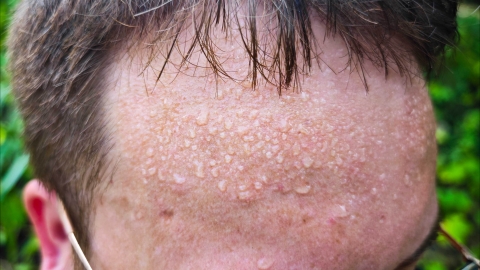What are the causes of sweating on a child's head?
Generally speaking, possible causes of excessive sweating on a child's head may include anxiety or stress, environmental factors, high metabolism, hyperthyroidism, and rickets. Symptomatic treatments such as general therapy or medication may be needed. If discomfort occurs, it is recommended to seek medical attention promptly and undergo appropriate treatment under a doctor's guidance. A detailed explanation is as follows:

1. Anxiety or Stress
Under conditions of tension or anxiety, the sympathetic nervous system becomes activated, making sweating more likely. This is often accompanied by emotional fluctuations, insomnia, and difficulty concentrating. It is recommended to learn relaxation techniques, such as deep breathing and meditation, which can help alleviate symptoms.
2. Environmental Factors
If a child is in a hot, humid environment or in a room where the air conditioner is set too low, the body may sweat to regulate body temperature, resulting in increased sweating on the head. It is recommended to adjust the indoor temperature and humidity, maintain a suitable environment, and avoid excessive heat or cold exposure for the child.
3. High Metabolism
Children generally have a higher metabolic rate than adults, which produces more heat to maintain thermal balance. The body dissipates heat through sweating, and since sweat glands are densely distributed on the head, sweating is more noticeable in this area. It is recommended to maintain an appropriate indoor temperature, wear breathable clothing, and encourage the child to drink plenty of water to maintain hydration.
4. Hyperthyroidism
Hyperthyroidism may be caused by autoimmune disorders, genetic factors, or environmental influences. Thyroid hormones promote metabolism and growth, but excessive secretion can lead to increased metabolism and sympathetic nervous system activation, resulting in excessive sweating. Other symptoms may include weight loss, palpitations, and irritability. It is recommended to follow a doctor's instructions for treatment with medications such as propylthiouracil.
5. Rickets
Vitamin D helps the body absorb and utilize calcium. A deficiency can lead to poor skeletal muscle development and increased nerve excitability, which may cause excessive sweating. In addition to sweating, symptoms may include restless sleep, easy startling, and枕秃 (baldness at the back of the head). It is recommended to include foods rich in calcium and vitamin D in the daily diet, and to use vitamin D drops, vitamin AD drops, or multivitamin tablets as directed by a physician to relieve symptoms.
It is also recommended to choose breathable, sweat-absorbing clothing for children, such as cotton garments, and to avoid overdressing or using excessively thick clothing.




